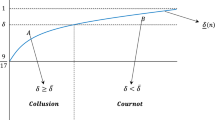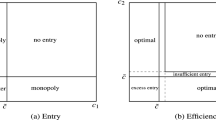Abstract
We consider a simple general equilibrium model with imperfect competition. Firms are price takers in the input market and compete à la Cournot in some or all of the product markets and their technologies display constant returns to scale. We show that an increase in the number of firms in a given sector does not always improve welfare. We also provide a characterization in terms of mark-up rates of the sectors for which entry is welfare enhancing. Our results challenge the common idea that mergers with no cost synergy are not desirable for consumers.
Similar content being viewed by others
References
Blanchard O (2006) Is there a viable European social and economic model? MIT Press, W.P., pp 6–21, Cambridge
Blanchard O, Giavazzi F (2001) Macroeconomics effects of regulation and deregulation in goods and labor markets, NBER (working paper No 8120, February)
Brown D, Wood GA (2004) The social cost of monopoly power (Cowles Foundation Discussion Paper 1466)
Crettez B, Fagart MC (2005) A note on the Pareto efficiency of general oligopolistic equilibria (working paper Crest)
Djankov S (2008) The regulation of entry (World Bank working paper)
Florenzano M, Le Van C (2001) Finite dimensional convexity and optimization, studies in economic theory, vol 13. Springer, Berlin
François J, Horn H (2000) Competition policy in an open economy (working Paper)
Ginsburgh V, Keyzer M (2000) The structure of applied equilibrium models. MIT Press, Cambridge
Herendorf B, Schmitz JA, Teixeira AM (2005) Are the plain-vanilla costs of monopoly small? (working paper)
Kelton CML, Rebelein RP (2003) A static general-equilibrium model in which monopoly is superior to competition (working paper)
Konishi HM, Suzumura K, Suzumura K (1990) Oligopolistic competition and economic welfare. J Publ Econ 42: 67–88
Lerner AP (1934) The concept of monopoly and the measurement of monopoly power. Rev Econ Stud 1(3): 157–175
Lipsey RG, Lancaster K (1956) The general theory of second best. Rev Econ Stud 24: 11–32
Motta M (2004) Competition policy, theory and practice. Cambridge University Press, London
Neary P (2002a) Competition, trade and wages. In: Greenaway D, Upward R, Wakelin K(eds) Trade, migration and labour market adjustment. Macmillan, London, pp 28–45
Neary P (2002b) Foreign competition and wage inequality. Rev Int Econ 10: 680–693
Neary P (2003a) Competitive versus comparative advantage. World Econ 26: 457–470
Neary P (2003b) The road less travelled: oligopoly and competition policy in general equilibrium. In: Arnott R, Greenwald B, Kanbur R, Cambridge BN(eds) Imperfect economics: essays in honor of Joseph Stiglitz. MIT Press, Mass, pp 485–500
Negishi T (1961) Monopolistic competition and general equilibrium. Rev Econ Stud 28: 196–201
Negishi T (1962) Entry and the optimal number of firms. Metroeconomica XIV: 86–96
Nikaido H (1975) Monopolistic competition and effective demand. Princeton University Press, New Jersey
Posner R (2001) Antitrust and the new economy. Antitrust Law Journal 68: 925
Ruffin RJ (1999) Oligopoly and trade: what, how much, and for whom? (working paper)
Spear SE (2001) The electricity market game. Carnegie Mellon University, Pittsburgh
Stahn H (1999) Monopolistic behavior and general equilibrium: a generalization of Nikaido’s work. J Math Econ 32: 87–112
Author information
Authors and Affiliations
Corresponding author
Rights and permissions
About this article
Cite this article
Crettez, B., Fagart, MC. Does entry improve welfare? A general equilibrium approach to competition policy. J Econ 98, 97–118 (2009). https://doi.org/10.1007/s00712-009-0082-y
Received:
Accepted:
Published:
Issue Date:
DOI: https://doi.org/10.1007/s00712-009-0082-y




